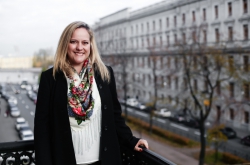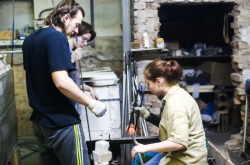Idea
It was back in 2009 when they started to introduce electronic diaries in Russian schools. The system allowed to partially “digitalize” the educational system, as electronic diaries made it possible to monitor students’ performance, as well as communicate relevant information to all participants of the educational process, parents included. Russian universities have also been using similar domestic systems and apps for a long time already.
Yet, in vocational schools, they were still doing many things manually as recently as several years ago. For instance, many vocational schools used the following attendance control procedure: the group president submitted a list of absent students to the dean’s office, where it was processed manually, and the attendance statistics was formed. The schedule was available on the website only, so the students found it hard to keep tabs on any changes.
This was the problem that Yaroslav Prokazchikov, then a student of the Saint-Petersburg Polytechnic College of Municipal Economy, had to deal with. In order to optimize the process, he and his team first developed a chat-bot, then a mobile app. For Yaroslav, who was only making his first steps in coding at that time, the project became a personal challenge. Though he lacked the necessary knowledge when he just started, it soon turned out that he succeeded in not just bringing his idea to life, but also improved his skills a lot.

“We began working on the project about two years ago. At that time, we didn’t have enough programming knowledge, but as we learned, we improved. During our final year, we already started to think about ways to further complement our project. So we added a system that can optimize and speed up the communication between group presidents and fellow students. Further on, we started to systematically study the problems that exist in vocational schools, and the ways to solve them. In the end, we came up with the idea of an electronic roll book, remembers Yaroslav Prikazchikov. As opposed to schools, where they use the public system, or universities that develop their own applications, vocational schools lack the necessary resources, and thus still do lots of things manually. Our project’s goal is to make secondary vocational education modern, digitize it. We plan to do that on our own or prompt the government or major companies to do that by showing an example.”
After graduating from the college, Yaroslav didn’t forget his project. After entering ITMO University, he applied for the Future Technologies Accelerator and got accepted.
How it works
As of now, there are three modules in the system:
1) a mobile application available to both students and lecturers. They can use it to check with the schedule and get notifications about any changes: targeted notifications from lecturers and general ones that have to do with changes in the schedule, as well as search for information by student groups and lecturers. The app also holds information about home assignments, which is synchronized amongst the students, and the educational institution’s relevant news.

2) electronic roll book that is bound to the app and is kept by the group president. The dean can access the roll book to check the statistics, and parents get notifications if the student is absent.
3) communication systems for students, staff and parents. To get in touch with a particular person, you write a message and choose a category (students, teachers, parents), and the message is sent to the mobile app, chat-bot, e-mail and so on; what is more, you can see whom the message was sent to, who read it and who confirmed receiving the information.
“Our modules complement each other. The basis is the mobile app and the system that operates it; other modules are built upon it, comments Yaroslav Prikazchikov. The communication system also connected to the mobile app, where the mail outs are published. The roll book is kept by the group president, who uses the mobile app to mark attendance.”
Working with vocational schools
The project’s target audience is administrators, students and parents. According to Yaroslav Prikazchikov, it’s quite big - there are about 3.5 thousand vocational schools in Russia, and by no means do all of them have a domestic solution for optimization and digitalization of educational processes.
As of now, some vocational schools use systems like 1C College for document management, for example to issue orders and other similar things. Still, such systems are not designed for working with students. On the other hand, there are various solutions designed for universities, that the developers perceive as their indirect competitors. Introducing such solutions in a secondary vocational education institution will call for considerable optimization, as the educational process at vocational schools has its peculiarities. For instance, the parents of college students are also active participants of the educational process, so the system has to consider their needs, as well.

“There already exist systems that are aimed at universities; naturally, it is possible to develop something similar for vocational schools, as well. Still, processes adopted in vocational schools have their peculiarities. As a rule, it is the major players who focus on solutions for universities, and they will take some time to optimize their solutions for vocational schools. This is why we can well outrun them and offer our own solution that already considers the specifics of secondary vocational education institutions,” explains the project’s author.
Team
Two developers are now working on the project - Yaroslav Prikazchikov, student of ITMO’s Institute of International Development and Partnership and the project’s author is responsible for the overall development and interaction with educational institutions, and Oleg Karlovsky, game designer at Nival, is responsible for the project’s technical side. The team members met at the programming tournament that was part of the Worldskills competition, and decided to collaborate on a common project.
“Same as myself, Oleg has long been focusing on his own projects, he already has several good games released on Google Play. He is very active and competent. Having a good team is very important for your success, and with Oleg, I can always be confident in our results,” comments Yaroslav.
Project’s current state
The system’s basic components have already been tested; the team already has the minimum viable product. During their time at the accelerator, they’ve also developed a new module - the electronic roll book, and tested about 20 different business hypotheses. For now, Yaroslav and Oleg are negotiating with vocational schools, and several of St. Petersburg’s educational institutions have already agreed to test the new service.

Future prospects
The developers have already started to monetize the project, and plan to focus on servicing. As opposed to applications aimed at universities that are rarely updated once they’ve been developed, makeeducationbetter will be constantly improved in order to be ever-relevant.
What is more, the developers also plan to add four new modules to the system, continue working with their present clients and gradually introduce their project in the regions. According to Yaroslav, vocational schools in Kazan, Nizhny Novgorod and Ekaterinburg have already shown interest in the system. By the middle of summer, the project’s authors aspire to collect comprehensive data from the system’s testing in St. Petersburg vocational schools and use it to demonstrate how exactly it helps to optimize the educational process in vocational schools.





